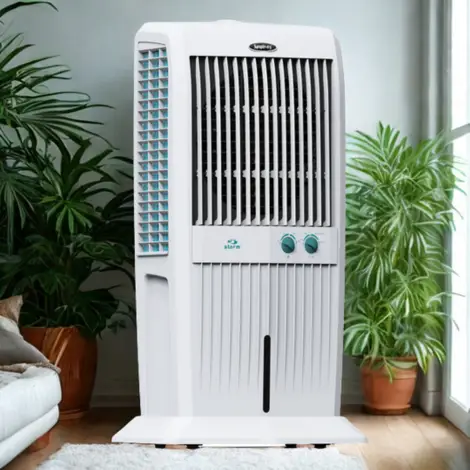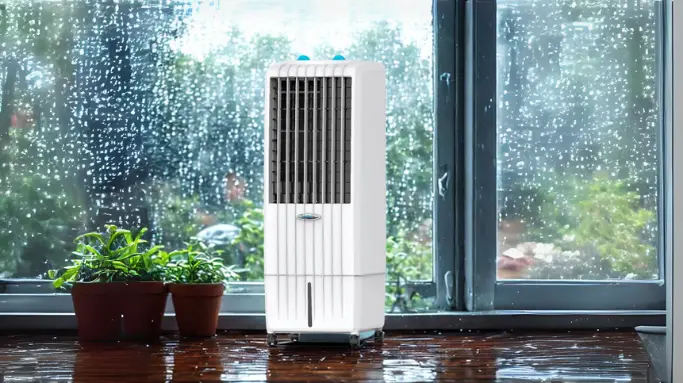Monsoon brings much-needed relief from the scorching heat, but it also brings its own set of challenges. High humidity, dampness, and fluctuating temperatures can make it difficult to stay comfortable indoors. In such conditions, choosing the right cooling system becomes crucial. While air conditioners (AC) have been the traditional choice for cooling, air coolers are becoming increasingly popular due to their unique advantages, especially during the monsoon season.
In this article, we will explore how air coolers can be more effective than ACs during the monsoon and why they are the ideal choice for keeping your home cool, comfortable, and energy-efficient.
1. Air Coolers Provide Better Humidity Control
One of the biggest challenges of the monsoon season is the high humidity levels that accompany the rain. Excess humidity can make the air feel warmer and more uncomfortable, even though the temperature might be lower than usual. Air coolers are designed to handle humidity better than ACs because they use the process of evaporative cooling.
Evaporative cooling works by pulling in hot air, passing it through water-soaked pads, and releasing cool, moist air into the room. This not only cools the room but also adds a layer of moisture to the air, which helps alleviate the dryness caused by ACs. On the other hand, ACs tend to dry out the air, which may exacerbate respiratory issues during the monsoon when moisture levels are already high.
2. Air Coolers Are Energy-Efficient and Cost-Effective
During the monsoon, the weather is cooler, and there is less need for extreme cooling. Air conditioners can be overkill in such conditions, leading to high electricity bills. ACs consume significantly more energy than air coolers because they rely on compressors to cool the air. In contrast, air coolers use much less electricity as they function primarily on water and a fan to circulate cool air. This energy efficiency makes air coolers a more cost-effective option during the monsoon season.
With rising electricity costs and the increasing need to be eco-conscious, many people are turning to air coolers as an affordable and sustainable alternative to ACs. Not only do air coolers save on energy costs, but they are also environmentally friendly since they don’t rely on refrigerants, which can have a negative impact on the environment.

3. Air Coolers Are Ideal for Ventilation and Fresh Air Flow
One of the key advantages of air coolers over ACs is their ability to provide constant fresh air flow. Air coolers bring in outdoor air, cool it, and circulate it inside your home. This constant flow of fresh air helps to improve indoor air quality, which can be compromised in a closed, air-conditioned environment. In a humid and rainy climate like that of the monsoon, the constant introduction of fresh air is essential for keeping your living space dry and well-ventilated.
On the other hand, air conditioners recirculate the same air inside the room, which can lead to stuffiness and a lack of proper ventilation. This can be particularly uncomfortable during the monsoon when you need good airflow to prevent the buildup of moisture, mold, and mildew.
4. Air Coolers Are Healthier for Your Skin and Respiratory System
The air during the monsoon season tends to be damp, and this moisture can negatively affect your skin and respiratory health. ACs, although effective at cooling, dry out the air, which can lead to skin dryness, irritation, and even respiratory discomfort. For individuals with allergies or asthma, the dry, recirculated air from ACs can exacerbate symptoms.
In contrast, air coolers add moisture to the air, which can help maintain skin hydration and prevent dryness. The gentle cooling and humidity provided by air coolers are also beneficial for individuals who suffer from respiratory issues, as the moist air can help soothe the airways and reduce irritation.
5. Easy Maintenance of Air Coolers During the Monsoon
During the monsoon season, the weather conditions are conducive to mold growth and dust accumulation. While ACs need regular servicing and maintenance to ensure they function optimally, air coolers are relatively low-maintenance. Their cooling pads need to be cleaned and replaced periodically, but the process is straightforward and doesn’t require a professional technician.
Additionally, air coolers are portable and easy to move around, allowing you to adjust their position depending on where you need cooling the most. This is especially convenient during the monsoon when different parts of your home may experience varying humidity levels.
6. Air Coolers Offer Quick and Efficient Cooling
Air coolers can cool a room effectively, especially in spaces with good ventilation. They are designed to provide rapid cooling by using the power of evaporation, and they can be turned on at a moment’s notice. This makes them ideal for monsoon weather when temperatures can fluctuate quickly.
Since air coolers are generally smaller and lighter than air conditioners, they cool smaller areas more effectively. In contrast, ACs require more time to cool down a space and can be less efficient in areas with poor insulation or ventilation, which is common in homes during the rainy season.
7. No Cold Air Shock or Discomfort
ACs often blow very cold air, which can result in a sudden temperature change when you step into an air-conditioned room from the humid outdoors. This abrupt temperature difference can be uncomfortable and even cause health issues such as cold and cough.
Air coolers, however, provide a more natural and gradual cooling effect. The air is typically cooler than the surrounding environment, but not uncomfortably cold. This makes air coolers a more comfortable and safer option for cooling during the monsoon season, where rapid temperature changes can cause discomfort.
FAQs About Air Coolers During the Monsoon
FAQs About Air Coolers During the Monsoon
Q1: Are air coolers effective in humid weather?
Yes, air coolers work best in areas with moderate humidity, and they are designed to handle high moisture levels during the monsoon. While they add moisture to the air, they do not make the room excessively humid, unlike ACs that dry out the air.
Q2: How can I improve the efficiency of my air cooler during the monsoon?
To improve the efficiency of your air cooler, ensure that the water level is maintained, clean the cooling pads regularly, and place the cooler near an open window to allow for better airflow. Avoid using the air cooler in closed spaces with poor ventilation.
Q3: Do air coolers use more electricity than ACs?
No, air coolers use significantly less electricity compared to air conditioners. They are energy-efficient and ideal for cooling during the monsoon when excessive cooling is not required.
Q4: Can I use an air cooler in a room with high humidity?
Air coolers are effective in areas with moderate to high humidity, but if the humidity level is excessively high, the cooling efficiency may decrease. It is always advisable to ensure proper ventilation when using an air cooler.
Q5: What maintenance is required for an air cooler during the monsoon?
Air coolers require basic maintenance during the monsoon, such as cleaning the water tank, replacing the cooling pads, and checking the fan and pump for any blockages. Regular cleaning helps maintain optimal performance and prevents mold growth.
